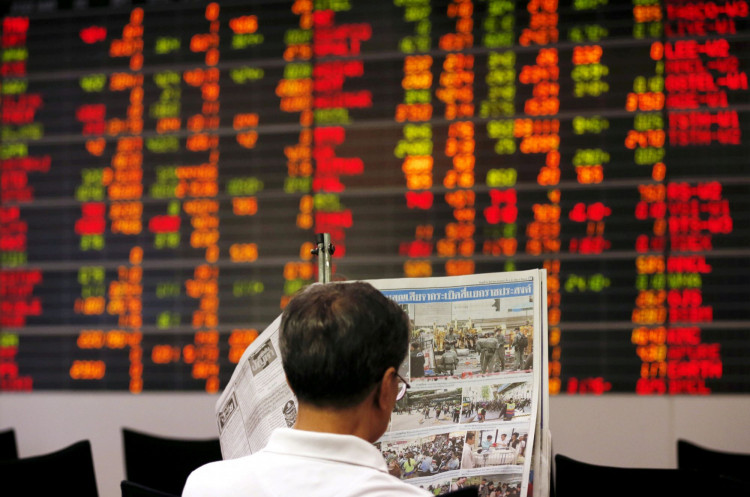Since the beginning of this year, AI and battery stocks have been major drivers of Taiwan's and South Korea's substantial market gains.
The KOSDAQ index, which includes this year's hot battery stocks in South Korea, has only been outperformed by NASDAQ in terms of year-to-date growth. The Taiwan Weighted Index is now the fourth strongest among major global stock indices. As of July 13, the top five Taiwanese stocks in terms of year-to-date gains were Wistron, Gigabyte, Creative, Quanta, and Casetek, all of which are closely linked to generative AI. Wistron, with a surge of 349%, leads the pack.
However, recently, there are signs that AI stocks in Taiwan and battery stocks in South Korea have peaked.
Following a big drop on Monday, Taiwan's AI stocks fell more than 6% again today. On the last trading day of July, Taiwan stocks suffered a big blow. The computer and peripheral equipment sector of Taiwan stocks plummeted 6.48% on Monday, under the "double blow" of AI leaders drastically lowering revenue guidance and institutions bearish on the AI sector. The sector has risen nearly 27% since July.
In the past two trading days, this sector of Taiwan stocks is still in adjustment, with a steep decline of 6.62% on Wednesday.
At the close on Wednesday, the Taiwan Weighted Index fell 1.85%, with AI concept stocks leading the decline.
AI concept stocks such as Wistron, Quanta, and Wymicro all hit the down limit.
Today's fall in Taiwan's AI stocks was unavoidably influenced by the "black swan" event in the United States.
Due to Fitch's downgrade of U.S. debt to "AA+", major U.S. tech stocks fell collectively before the U.S. stock market opened on August 2, with Apple down nearly 1%, Microsoft, Google, Amazon, and Meta down more than 1%, and Tesla down more than 3%.
The Asia-Pacific markets all closed down.
However, some analysts believe that Taiwan's AI stocks have been in a big market for more than a month, and the continuous plunge makes people wonder if "AI really needs a break".
Other analysts have suggested that the ongoing AI race initiated by U.S. tech giants confirms the long-term trend of AI. Given the massive scale of the AI theme, the current fund turnover and correction is not a bad thing. After the funds rotate, they will still return to AI in the second half of the year.
South Korean battery stocks saw a surge in short selling, with three major Wall Street firms betting collectively on a downward adjustment of Korean battery stocks.
Recently, EcoPro, a Korean power battery stock that has surged nearly ten times this year, experienced a thrilling trend.
EcoPro, the leading Korean battery material manufacturer, soared nearly tenfold this year, winning the affection of Korean retail investors. However, on July 26, EcoPro's stock price fell nearly 30% less than an hour after hitting a record high. The next day, it continued to fall, with a two-day cumulative plunge of nearly 20%.
POSCO, another popular retail stock this year, experienced a similar trend last week.
POSCO Chemical, a subsidiary of the POSCO Group, is a battery material supplier to LG Energy Solution, BYD, and other companies. POSCO has risen 122% this year.
Insiders believe that the sudden drop in EcoPro's stock price last Wednesday was caused by large-scale retail selling.
Data from the Korea Exchange shows that retail investors sold a net of KRW 6.295 trillion in EcoPro shares and KRW 7.392 trillion in shares of its subsidiary, EcoPro BM, from June 24 to 28.
Until recently, the stock prices of EcoPro, POSCO, and the LS Group of Korea, among others, are still bullish. However, the market is increasingly worried about the surge in short selling of battery stocks.
In early July, the LS Group of Korea announced that it would accelerate its entry into the electric vehicle charging industry, making LS a new battery concept stock that has attracted attention.
Data from the Korea Exchange shows that short selling transactions on the KOSPI index and the KOSDAQ index in July reached a new monthly high of KRW 22.87 trillion ($178.3 billion), an increase of over 55% from the previous month.
Some institutional investors also view the recent rise in South Korea's battery stocks as a bubble and have participated in short selling, betting on a downward adjustment of South Korea's battery stocks.
According to data from the operator of the Korea Exchange, Goldman Sachs, Merrill Lynch, and Morgan Stanley, three institutional investors, were all on the list of investors with a large short balance of EcoPro last week.
Worries about short selling of battery stocks are affecting the overall mood of the South Korean stock market, and the violent fluctuations in the trends of large battery stocks are also increasing concerns about volatility in the South Korean tech market.






